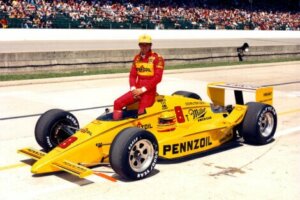All About the Indianapolis 500

As you might have already guessed from the name, the Indianapolis 500 is a motor race in the city of Indiana, United States. It’s 500 miles from start to finish. In this article, we’ll tell you all about this famous and impressive race.
The history of the Indianapolis 500
The Indianapolis Motor Speedway was built in 1909 and the first race took place two years later. The first-ever winner was Ray Harroun, who owed his victory to the use of a relatively new invention – the rear-view mirror.
From this first race until 1955, excluding during the two world wars, the Indianapolis 500 was organized and arbitrated by the American Automobile Association (AAA).
After calculating the total length of the oval track (2.5 miles) and considering safe distances between cars, the organizers set the number of race participants at 33. Following the Le Mans disaster in 1955, the race was organized by the USAC (United States Autoclub), and to this day, it’s the biggest event in the national championship.
Since 1936, the winner of the Indy 500 has won the Borg-Warner Trophy, a silver trophy featuring the name of every single winner engraved on it.
In 1977, a woman, Janet Guthrie, participated for the first time. Since then, there have been nine females participating in the Indianapolis 500. As a result, the race organizers changed the phrase, “Gentlemen, start your engines” to the more inclusive, “Ladies and gentlemen, start your engines”.
Interestingly, not a single African American driver participated in the race until 1991, when Willy T Ribbs took part.

Top winners of the Indianapolis 500
There are three drivers who’ve each won the Indy 500 four times, and all of them were born in the United States.
1. A. J. Foyt
Motorsport fans consider Anthony Joseph Foyt Jr. to be one of the best in motorsport history in the United States. He won the Indianapolis 500 in 1961, 1964, 1967, and 1977 and he was the first to win the race on four occasions.

This Houston-born racer also achieved a total of 67 race wins and seven USAC National Championships between 1960 and 1979. He retired in 1993.
2. Al Unser
Alfred Unser was born in New Mexico and excelled in single-seater vehicles between the 1960s and 1990s. He was the second driver to win the Indianapolis 500 four times: 1970, 1971, 1978, and 1987.

Not only that, but he also won the national championship three times. His brother Bobby Unser and son Al Unser Jr are both also winners of the Indianapolis 500. They’re clearly a successful racing family!
3. Rick Mears
Born in Kansas, Mears won the Indianapolis 500 in 1979, 1984, 1988, and 1991. He also holds the record for six pole positions in this competition.
The car that Mears used was known as the Yellow Submarine because it was sponsored by the lubricant brand Pennzoil whose company color was yellow.

There are also a number of other drivers of various nationalities who have won the Indianapolis 500 on more than one occasion, including two Brazilians, a Scotsman, a Dutchman, an Englishman, and a Colombian. Particularly noteworthy drivers include Louis Meyer, Emerson Fittipaldi, Bobby Unser, and Wilbur Shaw.
The American company, Offenhauser, has achieved a podium finish 24 times. Their engine, known as Offy dominated the race until 1975.
These days, the two companies who normally fight it out to win each year are Honda and Chevrolet. These two were the dominant forces in the 2000s and 1980s, respectively, and every year they guarantee a great show!
As you might have already guessed from the name, the Indianapolis 500 is a motor race in the city of Indiana, United States. It’s 500 miles from start to finish. In this article, we’ll tell you all about this famous and impressive race.
The history of the Indianapolis 500
The Indianapolis Motor Speedway was built in 1909 and the first race took place two years later. The first-ever winner was Ray Harroun, who owed his victory to the use of a relatively new invention – the rear-view mirror.
From this first race until 1955, excluding during the two world wars, the Indianapolis 500 was organized and arbitrated by the American Automobile Association (AAA).
After calculating the total length of the oval track (2.5 miles) and considering safe distances between cars, the organizers set the number of race participants at 33. Following the Le Mans disaster in 1955, the race was organized by the USAC (United States Autoclub), and to this day, it’s the biggest event in the national championship.
Since 1936, the winner of the Indy 500 has won the Borg-Warner Trophy, a silver trophy featuring the name of every single winner engraved on it.
In 1977, a woman, Janet Guthrie, participated for the first time. Since then, there have been nine females participating in the Indianapolis 500. As a result, the race organizers changed the phrase, “Gentlemen, start your engines” to the more inclusive, “Ladies and gentlemen, start your engines”.
Interestingly, not a single African American driver participated in the race until 1991, when Willy T Ribbs took part.

Top winners of the Indianapolis 500
There are three drivers who’ve each won the Indy 500 four times, and all of them were born in the United States.
1. A. J. Foyt
Motorsport fans consider Anthony Joseph Foyt Jr. to be one of the best in motorsport history in the United States. He won the Indianapolis 500 in 1961, 1964, 1967, and 1977 and he was the first to win the race on four occasions.

This Houston-born racer also achieved a total of 67 race wins and seven USAC National Championships between 1960 and 1979. He retired in 1993.
2. Al Unser
Alfred Unser was born in New Mexico and excelled in single-seater vehicles between the 1960s and 1990s. He was the second driver to win the Indianapolis 500 four times: 1970, 1971, 1978, and 1987.

Not only that, but he also won the national championship three times. His brother Bobby Unser and son Al Unser Jr are both also winners of the Indianapolis 500. They’re clearly a successful racing family!
3. Rick Mears
Born in Kansas, Mears won the Indianapolis 500 in 1979, 1984, 1988, and 1991. He also holds the record for six pole positions in this competition.
The car that Mears used was known as the Yellow Submarine because it was sponsored by the lubricant brand Pennzoil whose company color was yellow.

There are also a number of other drivers of various nationalities who have won the Indianapolis 500 on more than one occasion, including two Brazilians, a Scotsman, a Dutchman, an Englishman, and a Colombian. Particularly noteworthy drivers include Louis Meyer, Emerson Fittipaldi, Bobby Unser, and Wilbur Shaw.
The American company, Offenhauser, has achieved a podium finish 24 times. Their engine, known as Offy dominated the race until 1975.
These days, the two companies who normally fight it out to win each year are Honda and Chevrolet. These two were the dominant forces in the 2000s and 1980s, respectively, and every year they guarantee a great show!
All cited sources were thoroughly reviewed by our team to ensure their quality, reliability, currency, and validity. The bibliography of this article was considered reliable and of academic or scientific accuracy.
- Indy 500 Traditions and FAQs. Indianapolis Motor Speedway. https://www.indianapolismotorspeedway.com/events/indy500/history/indy-500-traditions-faqs/faqs
- Lasso, J. 10 curiosidades históricas sobre las 500 millas de Indianápolis. Lancelot Digital. Mayo 2019. https://www.lancelotdigital.com/motor/10-curiosidades-historicas-sobre-las-500-millas-de-indianapolis
- Parabrisas. A 108 años de la primera carrera de las 500 millas de Indianapolis. Mayo 2019. https://parabrisas.perfil.com/noticias/novedades/a-108-anos-de-la-primera-carrera-de-las-500-millas-de-indianapolis.phtml
This text is provided for informational purposes only and does not replace consultation with a professional. If in doubt, consult your specialist.








